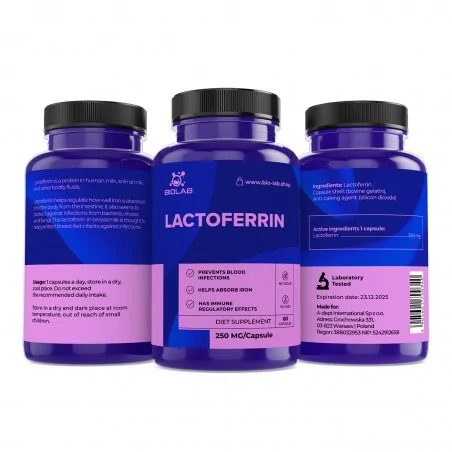
LACTOFERRIN 250mg
Product code:
Buy 3 and get 3% discount
Buy 5 and get 5% discount



Product code:
























LACTOFERRIN 250mg/capsule
Lactoferrin appears to be the whey subfraction with the best documented antiviral, antimicrobial, anticancer and immune modulating/enhancing effects. When we talk about whey, we are actually referring to a complex protein composed of many smaller protein subfractions (peptides). Many of these subfractions are found only in very small amounts in cow's milk, usually less than 1%. For example, lactoferrin makes up only 0.5% to 1% or less of the whey protein from cow's milk. On the other hand, breast milk contains up to 15% lactoferrin.
1 Lactoferrin helps boost immunity.
Lactoferrin concentrates in the mouth, where it comes into direct contact with pathogens (i.e. viruses, bacteria, etc.) and kills or significantly suppresses these pathogens through a number of different mechanisms. In fact, there are specific receptors for lactoferrin located on many key immune cells, such as lymphocytes, monocytes and macrophages, and they are known to be directly involved in regulating the activity of natural killer (NK) cells.
2 Gastrointestinal function.
It has been found to significantly reduce systemic and intestinal inflammation, including in conditions such as inflammatory bowel disease. Animals exposed to a variety of pathogens known to cause both systemic and intestinal inflammation and damage show significantly greater immunity and reduced inflammation when fed lactoferrin.
3 Antiviral effects
Lactoferrin has been found to both directly and indirectly inhibit several disease-causing viruses in humans. For example, in vitro (in a test tube) studies have shown that lactoferrin strongly inhibits HIV (the virus thought to cause AIDS). The exact clinical relevance of this information has not yet been clarified, but lactoferrin may be an extremely effective, non-toxic compound in the fight against viruses that cause death and ill health in humans
Science is studying lactoferrin in search of potential treatments and diagnostic tools for a wide range of human ailments. Further research on this bioactive peptide is expected to emerge.
One study titled "Lactoferrin and Antibodies to Lactoferrin: Effects of iron loading of lactoferrin on albumin extravasation in different tissues in rats" (Erga KS, Peen E, Tenstad O, Reed RK) showed that lactoferrin devoid of iron, but not iron saturated, can protect lung tissue during the release of reactive oxygen species. In vivo, only iron-deficient lactoferrin reduced inflammatory hyperpermeability in mouse and rat lung tissue. While this is interesting, additional studies are needed to confirm the protective role of lactoferrin in lungs that have been damaged during hyperinflammatory periods.
A study published in the December 2000 issue of the Journal of Cell Biochem (15;79(4):583-593) found that lactoferrin is involved in the regulation of CD4 lymphocytes, which are essential to the body's ability to fight disease. It is well known that lactoferrin is directly involved in the host immune response, and this study may be another piece of the puzzle involved in linking lactoferrin to the immune system.
1. Murphy ME, Kariwa H, Mizutani T, Yoshimatsu K, Arikawa J, Takashima I. In vitro antiviral activity of lactoferrin and ribavirin upon hantavirus. ArchVirol 2000;145(8):1571-82.
2. Haversen LA, Engberg I, Baltzer L, Dolphin G, Hanson LA, Mattsby-Baltzer I. Human lactoferrin and peptides derived from a surface-exposed helical region reduce experimental escherichia coli urinary tract infection in mice. Infect Immun 2000 Oct;68(10):5816-23.
3. Yamauchi K, Hiruma M, Yamazaki N, Wakabayashi H, Kuwata H, Teraguchi S, Hayasawa H, Suegara N, Yamaguchi H Oral administration of bovine lactoferrin for treatment of tinea pedis. A placebo-controlled, double-blind study. Mycoses 2000;43(5):197-202.

Your review appreciation cannot be sent
Report comment
Report sent
Your report cannot be sent
Write your review
Review sent
Your review cannot be sent
Customers who bought this product also bought:
Minoxidil 80mg/1ml - 30ml
KPV capsules 150mcg
B7-33 6mg
Atomizer
YOHIMBINE HCL 30ml
SUNIFIRAM 10mg/ 60caps
BYE ACNE
ALPHA-LIPOIC ACID...
Newsletter
SIGN UP AND STAY UP TO DATE!
We specialize in wholesale and retail supply of high quality peptides.
Category
Our company
Add to wishlist
((title))
Sign in
You need to be logged in to save products in your wishlist.